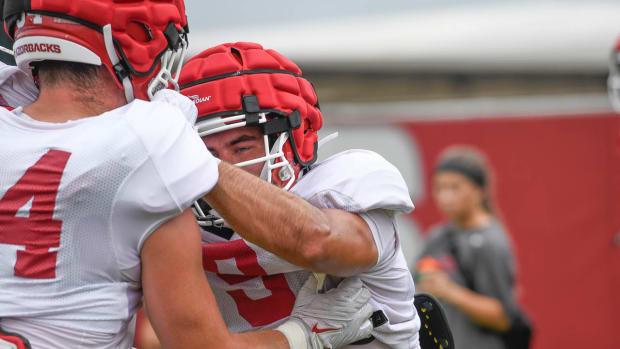On a healthy path, Jerry Kill returns to coaching at Rutgers
PISCATAWAY, N.J. (AP) Jerry Kill has been seizure-free for almost a year and a half. He has lost 25 pounds by cutting way down on carbs and taking long walks. After years of sleeping two or three hours a night, he now regularly gets six or more.
The former Minnesota coach still needs medication to treat his epilepsy and control the seizures that forced him to leave coaching during the 2015 season, but lifestyle changes have been an important part of facing a condition he was once hesitant to even acknowledge.
Kill was feeling so good that he decided to return to coaching as offensive coordinator at Rutgers after more than a season away. Seven hectic months into being part of Chris Ash's program rebuild and all is still well, according to Kill and his wife, Rebecca.
The next phase of his comeback starts soon. The Scarlet Knights begin preseason camp this week and open against Washington on Sept. 1. Jerry Kill said the in-season routine should help him maintain good habits and Rebecca is confident, too. Still, after more than two decades of worrying about her husband's health, she expects anxious moments.
''I'm never going to get over that,'' Rebecca Kill said. ''I'm always going to have that in the back of my mind, but because he's doing what he loves - and he's absolutely loving coaching - I truly believe he's going to be OK.''
Epilepsy is a chronic neurological disorder that can lead to loss of consciousness and convulsions.
Jerry Kill, 55, had his first seizure in 2000 when he was coach at Emporia State and a sideline seizure in 2005 when he was head coach at Southern Illinois led doctors to discover he also had kidney cancer. Kill beat the cancer, though for years he would say he had seizure disorder, shying away from calling it epilepsy.
''The word epilepsy is different from saying seizure disorder to me,'' Kill said. Not only does he no longer shy away from calling his condition what it is, he wrote a book about his battle with epilepsy called ''Chasing Dreams,'' and started a fund by the same name with the Epilepsy Foundation of Minnesota.
Rebecca Kill said it wasn't until 2013, when seizures forced Jerry to miss a game at Michigan, that he truly began to commit to getting his epilepsy under control. Still, it was a struggle. Jerry Kill has tried various medications, but the side-effects can be brutal.
One drug made him short-tempered and wired. Another brought him down.
In 2015, the seizures became too much and he stepped down as Minnesota coach seven games into the season. Retired.
The Kills escaped to their vacation home in Siesta Key, Florida. Finally, after years of focusing so much time and energy on his programs and players, Jerry was able to concentrate on helping himself.
He began walking for exercise, often with Rebecca. Ten miles a day at his peak - though not necessarily all at once.
''I lost around 25 pounds,'' Kill said. One look at Kill now compared to him in the older pictures he had yet to hang on his office walls at Rutgers shows he is not exaggerating.
Kill has all but eliminated carbohydrates from his diet, and drinks water instead carbonated soft drinks.
''What's tough to give up? Pizza,'' Jerry Kill said. ''Every once in a while I reward myself with some cookies and things of that nature. I stay pretty true to it.''
The biggest change was sleep. He had been living dangerously deprived for years. Now there are nights he actually gets eight hours.
''And just being able to just kind of get that under control is a huge help,'' Rebecca Kill said.
Dr. Joseph Sirven, a professor of neurology and the editor-in-chief of Epilepsy.com, said lifestyle measures can be an important part of seizure treatment.
''For some, stress, sleep deprivation and poor eating can exacerbate seizures in people with uncontrolled seizures,'' he said. ''It stands to reason that addressing those lifestyle measures can lessen the likelihood of seizure recurrence and gives a chance for seizure medicines to work.
''However and sadly, lifestyle changes do not completely control seizures in many patients. That is why medications and other treatments are needed.''
Kill has found a medication that is effective, and since it doesn't burden him with harsh side effects, he has been better at sticking to the regiment.
Last season, Kill worked at Kansas State as a liaison between the football program and the athletic directors' office. It was a low-pressure way to get back in the game. But he missed coaching. When Ash inquired, Kill liked what the Rutgers' coach had to say - and so did Rebecca.
Ash said he and Jerry Kill have had candid conversations about worst-case scenarios.
''Right now he's great, but what happens when we get into the season? Time demands are different. Stress levels go up,'' Ash said. ''We thought about all of that stuff.''
There was a point at Minnesota when Rebecca Kill received NCAA permission to go on recruiting trips with Jerry because of the possibility he would have a seizure. That hasn't been the case at Rutgers and you can hear the joy in Rebecca Kill's voice when she talks about Jerry's trips to Georgia, Florida and California.
''For him to be able to travel across country and do all that without having any issues is just incredible,'' she said with a chuckle.
Jerry Kill acknowledges the walks have been harder to squeeze in and eating right not quite as easy since starting a new job. Rebecca tries to get to campus and walk with him during breaks. And she is constantly on him to get some rest.
''My wife drives me nuts and I tell her that from time to time,'' Jerry Kill said, with a smile. ''She'll always be that way. She's had to see it more than anybody else.''
---
Follow Ralph D. Russo at www.Twitter.com/ralphDrussoAP
---
More college football coverage: http://collegefootball.ap.org/




